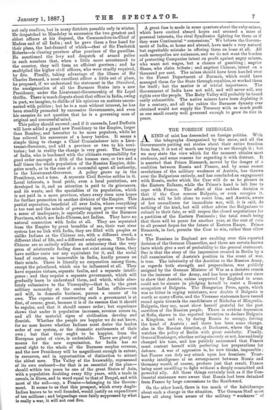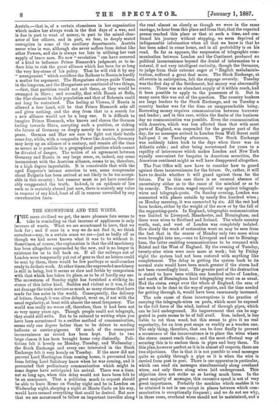THE FOREIGN IMBROGLIO.
ASIND of mist has descended on foreign politics. With the telegraphs disorganised by the snow, and all the Governments putting out stories about their entire freedom from fear, it is not of much use trying to see through it ; but we may state the view which for the moment obtains most credence, and some reasons for regarding it with distrust. It is asserted that Prince Bismarck, moved by the danger of a coalition between Russia and France, and by some recent revelations of the military weakness of Austria, has thrown over the Bulgarians entirely, and has concluded an engagement with Russia, under which the Czar will do as he pleases in the Eastern Balkans, while the Prince's hand is left free to cope with France. The effect of this sudden decision is that if the Czar coerces Bulgaria, or even occupies it, Austria will be left alone to resist him, and Austria, aware of her unreadiness for immediate war, will, it is said, do nothing of the kind, but will either advise the Bulgarians to submit to their fate, or will reopen the closed negotiations for a partition of the Eastern Peninsula ; the total result being that there will be peace for another year, at the cost of ruin to all present hopes for the future of Eastern Euope. Prince Bismarck, in fact, permits the Czar to win, rather than allow a war.
The Russians in England are exulting over this reported• decision of the German Chancellor, and there are certain known facts which give a sort of probability to the general statement. One is that the story of the impression created in Berlin by a full examination of Austria's position in the event of war, is true. The inferiority of the Austrian to the Russian Army, as regards both strength and preparedness, was publicly assigned by the German Minister of War as a decisive reason for the increase of the Army, and has been quoted ever since to show that Austria, unless supported by England in arms, could not be sincere in pledging herself to resist a Russian occupation of Bulgaria. The Hungarian Press, again, which was so bitter in urging resistance, now doubts if Bulgaria is worth so many efforts, and the Viennese statesmen have veered round again towards the candidature of Nicholas of Mingrelia. Bulgaria, they say, must show herself grateful for the past sacrifices of the Russian people. There is evident depression at Sofia, shown in the reported intention to declare Bulgaria a Kingdom, and so, by daring Russia to occupy, forcing the hand of Austria ; and there has been some change, also in the Russian direction, at Bucharest, where the King watches the policy of Berlin with great assiduity. Finally, General Boulanger, whether acting sincerely or not, has suddenly changed his tone, and has publicly announced that France must content herself with perfecting her preparations for defence. A war of aggression is, he now thinks, impossible ; but France can defy any attack upon her frontiers. Trust- worthy intelligence of an arrangement between Russia and Germany would, of course, produce just that result, France being most unwilling to fight without a deeply committed and powerful ally. All these things certainly look as if the Con- tinental statesmen were aware that Russia had been detached from France by large concessions to the Southward.
On the other hand, there is too much of the kaleidoscope about such a change in the situation. The German Staff must have all along been aware of the military " weakness " of Austria,—that is, of a certain clumsiness in her organisation which makes her always weak in the first days of a war, and is due in part to want of money, in part to the mixed char- acter of her officers, and in part, we fear, to deeply seated corruption in some of the auxiliary departments. Austria never wins in war, although she never suffers from defeat like ether Powers, and she is always too late in utilising her vast supply of brave men. No new " revelation " can have occurred of a kind to influence Prince Bismarck's judgment, or to in- duce him to risk the great alliance which has been for so long the very key-stone of his policy. That he will risk it by any " arrangement " which sacrifices the Balkans to Russia is hardly a matter for argument. The Hungarians always guide Vienna in the long-run, and the Hungarians are convinced of two things, —first, that partition would not suit them, as they would be swamped in Slays ; and secondly, that with Russia at Sofia, the Slav element in their population and that of Bohemia could not long be restrained. The feeling at Vienna, if Russia is allowed a free hand, will be that Prince Bismarck asks all and gives nothing, and the step from that to a search for a new alliance would not be a long one. It is difficult to imagine Prince Bismarck, who knows and shares the German feeling towards Slays, accepting such a position, or risking the future of Germany so deeply merely to secure a present peace. German and Slav are sure to fight out their battle some day, while, with a composite Power like Austria, Germany may keep up an alliance of a century, and remain all the time as secure as is possible in a geographical position which cannot be divested of danger. The notion of an agreement between Germany and Russia in any large sense, or, indeed, any sense inconsistent with the Austrian alliance, seems to us, therefore, in a high degree improbable. It is conceivable that with the aged Emperor's intense aversion to war, some compromise about Bulgaria has been arrived at not likely to be too accept- able in this country ; but rumour must as yet have consider- ably exaggerated the truth. Indeed, in an epidemic of lies such as is certainly abroad just now, there is scarcely any value in rumour of any kind, least of all in rumour unverified by any .corroborative facts.















































 Previous page
Previous page